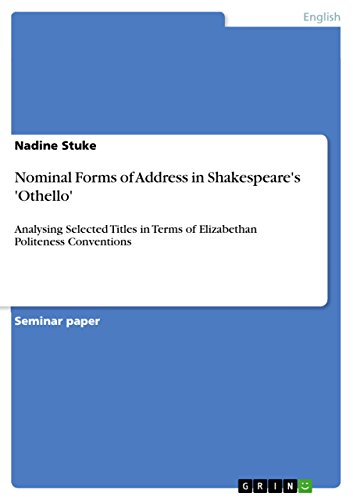Items related to Nominal Forms of Address in Shakespeare's 'Othello&#...
Nominal Forms of Address in Shakespeare's 'Othello': Analysing Selected Titles in Terms of Elizabethan Politeness Conventions - Softcover

"synopsis" may belong to another edition of this title.
- PublisherGrin Verlag
- Publication date2012
- ISBN 10 365626502X
- ISBN 13 9783656265023
- BindingPaperback
- Number of pages24
Buy New
Learn more about this copy
Shipping:
US$ 24.63
From Germany to U.S.A.
Top Search Results from the AbeBooks Marketplace
Nominal Forms of Address in Shakespeare's 'Othello'
Book Description Taschenbuch. Condition: Neu. This item is printed on demand - it takes 3-4 days longer - Neuware -Seminar paper from the year 2011 in the subject English Language and Literature Studies - Linguistics, grade: 1,7, University of Münster (Englisches Seminar), language: English, abstract: Today, the concept of politeness is not associated with class consciousness or social discrimination anymore, but in the sixteenth century this term was commonly linked to deference and showing respect (Watts 34). Thus appropriate language behaviour was of utmost importance to Elizabethan society. People of that time were always anxious to please their interlocutors, especially with reference to forms of address. Those address formulae had to be chosen accurately as they were very meaningful: Not only did they give information concerning personal relationships (Bruti 44) and emotions towards each other, but also about social ranks and hence power relations between speaker (S) and hearer (H). In Early Modern English times forms of address reflected the social hierarchy (Nevalainen & Raumolin-Brunberg 547; Replogle 102). So every title was assigned to a certain social status. To avoid using titles in an inappropriate or even impolite way, a lot of courtesy and conduct manuals were published (Watts 36).In the following attention will be drawn on Shakespeare's tragedy Othello (OTH) and the author's use of address terms, particularly relating to salutations used by husband and wife and that between friends. Is Shakespeare's choice of nominal address forms in accordance with Elizabethan conventions By concentrating on the marital relationship between the characters Othello and Desdemona as well as on that between the two 'friends' Othello and Iago, this term paper aims at answering this question. But before comparing Elizabethan conventions to Shakespeare's dramatis personae, it is necessary to illuminate Brown and Levinson's politeness concept that provides a basis for dealing with terms of address. 20 pp. Englisch. Seller Inventory # 9783656265023
Nominal Forms of Address in Shakespeare's 'Othello' : Analysing Selected Titles in Terms of Elizabethan Politeness Conventions
Book Description Taschenbuch. Condition: Neu. Druck auf Anfrage Neuware - Printed after ordering - Seminar paper from the year 2011 in the subject English Language and Literature Studies - Linguistics, grade: 1,7, University of Münster (Englisches Seminar), language: English, abstract: Today, the concept of politeness is not associated with class consciousness or social discrimination anymore, but in the sixteenth century this term was commonly linked to deference and showing respect (Watts 34). Thus appropriate language behaviour was of utmost importance to Elizabethan society. People of that time were always anxious to please their interlocutors, especially with reference to forms of address. Those address formulae had to be chosen accurately as they were very meaningful: Not only did they give information concerning personal relationships (Bruti 44) and emotions towards each other, but also about social ranks and hence power relations between speaker (S) and hearer (H). In Early Modern English times forms of address reflected the social hierarchy (Nevalainen & Raumolin-Brunberg 547; Replogle 102). So every title was assigned to a certain social status. To avoid using titles in an inappropriate or even impolite way, a lot of courtesy and conduct manuals were published (Watts 36).In the following attention will be drawn on Shakespeare's tragedy Othello (OTH) and the author's use of address terms, particularly relating to salutations used by husband and wife and that between friends. Is Shakespeare's choice of nominal address forms in accordance with Elizabethan conventions By concentrating on the marital relationship between the characters Othello and Desdemona as well as on that between the two 'friends' Othello and Iago, this term paper aims at answering this question. But before comparing Elizabethan conventions to Shakespeare's dramatis personae, it is necessary to illuminate Brown and Levinson's politeness concept that provides a basis for dealing with terms of address. Seller Inventory # 9783656265023

